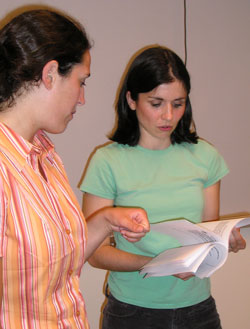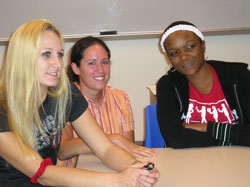 |
From left, UNMC medical students Sarah Dance and Allison Ramey discuss lesson plans for a health education meeting with inmates at the Douglas County Department of Corrections Day Reporting Center. |
Allison Ramey, a fourth-year medical student, and Sarah Dance, a third-year medical student, initiated the program through the UNMC Family Medicine Interest Group (FMIG).
Deb Winckler, a trauma therapist who works at the Douglas County Department of Corrections Day Reporting Center, became increasingly aware of the fact that most of the women lacked basic health information.
“They were grossly undereducated about how to protect themselves from AIDS, herpes and STDs, or how to recognize the signs and symptoms of when a friend or family member needed medical attention if there wasn’t blood or a broken bone,” Winckler said. “I wasn’t doing therapy so much as just sharing information.”
Winckler along with Connie Pfeifer, manager of the reporting center, decided it would be a great benefit to the women to have a health education program at the corrections facility.
“The inmates are typically first or second time offenders and have committed a nonviolent crime,” Winckler said. “The focus of the center is rehabilitation. Over the course of their incarceration they must demonstrate a willingness to obey rules and participate in self-improvement activities so that when the day of their release comes they are prepared to set upon a new course in life.”
In 2005, Ramey and Dance learned of the need for health education at the facility through their FMIG adviser, Paul Paulman, M.D., a professor in UNMC’s Department of Family Medicine.
At the time, Ramey was in her second year of medical school and was vice president of FMIG.
“I wanted to make sure that I did something with my position,” Ramey said. “You know in college or high school when people get positions in clubs but never do anything? I didn’t want to be like that. I actually wanted to do something good with my position.”
Ramey took on the challenge of developing a women’s health program at the corrections facility. She knew it wouldn’t be easy, but didn’t realize the time that it would take to organize such an activity.
“Understanding basic health care, we believe, is an important aspect of preparing these women for being successful in the workforce,” Dance said. “I thought it was a fantastic way to give medical information to an underserved and typically ignored population. The program has far exceeded my initial expectation.”
Helping the Women
After two years of developing the program, Ramey and Dance finally had their first meeting with the women on July 10 and now meet with the women every other Tuesday.
 |
Sarah Dance, middle, with two women participating in a health education program at the Douglas County Department of Corrections Day Reporting Center. Dance and fellow UNMC medical student, Allison Ramey, started the program for the incarcerated women. |
After the first meeting, Ramey and Dance had the women fill out surveys about what changes should be made and what topics they would be most interested in discussing.
The women seemed eager to learn more about women’s health, parenting and depression, since many of them already were dealing with these issues.
The program provides a safe and comfortable environment for the women to ask questions about personal issues.
The women, between the ages of 20 and 40, have found the program beneficial.
A couple women have taken notes at every meeting to share with their families and friends. Even though the program is early in its development, the inmates said they talk about it and look forward to it between meetings.
“Tonight one of my friends couldn’t come because she is pregnant and had a doctor’s visit,” one of the women said. “She takes notes at every meeting, so I am taking notes tonight. It’s a good thing, too, since the topic is pregnancy.”
Looking Ahead
By December, Ramey and Dance hope to have all the wrinkles ironed out and the program running smoothly. They then would like to start recruiting more female medical students for the program.
Once Ramey and Dance have trained their female recruits, they will begin focusing on implementing a men’s program. This will require them to find two male medical students who are up for the challenge of starting the program with the men at the corrections facility.
Ramey will graduate in May, so it will be up to Dance to keep the program alive. Ramey would like to stay in Omaha after graduation, but that is hard to determine at this point. If she does remain in Omaha, she said she will remain active with the program.
“We are giving the women additional tools to be successful when they leave the facility,” Dance said. “We hope knowing when and how to receive medical care, the importance of medicine and the benefits versus consequences of different actions will encourage the women to make healthy choices.”